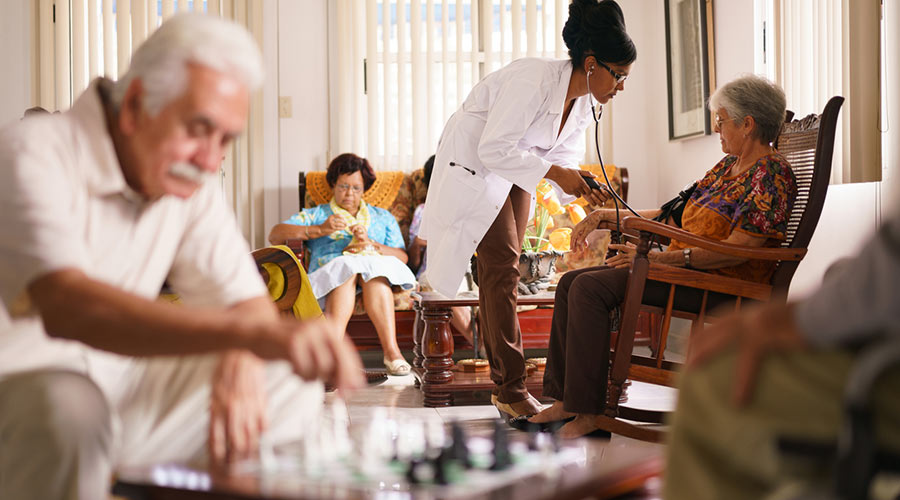The views expressed in our content reflect individual perspectives and do not represent the authoritative views of the Baha'i Faith.
I still have most of my real teeth, however alloyed they may be with various combinations of base and precious metals.
I may be childish at times, but I’m quite aware of that behavior, even as I have always been. But childish or not, I must face it now—I’m a whole lot closer to death than I am to birth. This requires serious contemplation. In one way, no matter what our age, we all approach death, every minute of every hour. Since time doesn’t ever move backwards, we each progress, one day at a time, toward our inevitable transition to the next phase of existence. Obviously, since we don’t know when death will call, we have no idea whether today is our last day on this physical plane, either.
The Fear of ALF’s
Do you fear the rest home? If we’re of a certain age, we probably all do. I saw my mother’s compatriots at the ALF (Assisted Living Facility) gradually turn from folksy, to forgetful, to mumbling and palsied fixtures wheeled from room to room. At the end, they would be placed in front of huge TV screens to which they were oblivious. At dinner time they would be spoon-fed like infants.
My father and brother never endured such indignity, nor did Mom, other than having to watch sadly as her friends and companions one by one traverse this final threshold. And yet, how strange of us to disdain what God has wrought. How dare we disparage any stage of life ordained by the natural course of things, especially a stage that serves as our final detachment from whatever fondness or glee we might still derive from this dust heap, the world, and from all vanity and feigned autonomy?

If you haven’t yet experienced this profound realization about life, just go visit an ALF. It will school you, I promise. You’ll see that yes, it is painful to watch these once noble visages and keen minds bereft of all they once held dear, but by what right do we disdain or ignore or conceal this final scene of life, especially should we live long enough to endure it ourselves? All the prophets of God have forbidden self-slaughter for a reason, so euthanasia is not an option except when machines do our living for us.
Perhaps we admire the one in a hundred who lives through this last stage of life with all important faculties intact—but do we then turn away in derision from those whose lives have become only waiting their turn to ascend? Surely as a natural course of things, this final stage has something noteworthy to teach us, some vital lesson for us to learn if we have the humanity and the patience to sit among the aged at this last station of their lives, to provide them a bit of companionship and love as we hold their hands in patient surveillance. The Baha’i teachings ask us to recognize life’s most vital lesson—that this physical existence is followed by a spiritual one:
Know then that “life” hath a twofold meaning. The first pertaineth to the appearance of man in an elemental body, and is as manifest to thine eminence and to others as the midday sun. This life cometh to an end with physical death, which is a God-ordained and inescapable reality. That life, however, which is mentioned in the Books of the Prophets and the Chosen Ones of God is the life of knowledge; that is to say, the servant’s recognition of the sign of the splendours wherewith He Who is the Source of all splendour hath Himself invested him, and his certitude of attaining unto the presence of God through the Manifestations of His Cause. This is that blessed and everlasting life that perisheth not: whosoever is quickened thereby shall never die, but will endure as long as His Lord and Creator will endure. – Baha’u’llah, Gems of Divine Mysteries, pp. 47-48.
When I first came to Florida forty years ago, I took note of what were then only a few of these incredible facilities, these ALF’s. In my young mind, they stood out as modern monuments to human ingenuity and cruel and heartless commerce. At the time I never dreamed that anyone I knew—my mother, for example—would willingly choose such a destiny. So, in mocking contempt, I wrote the following poem:
The Awful Wonders of the Sun Bay Towers Development for Senior Citizens
I am told that there is, neatly on the wall of each cubiculum in the looming white monument to mercantility rising before me, a door two feet square, coal-bin-hatch size, stainless steel, hinged at the top, connected to a chute so when pains come tingling up the arm, one simply leans forward from the waist, then it’s zoom down the slide to the basement and plop in the red velvet box on rollers tripping the lid shut—the momentum carrying the whole assemblage (me inside) into the back of a dark waiting Cadillac, station-wagon shaped, motor running.
But as I watched the occupants at my mother’s facility dodge the children on Sunday when grandchildren and great grandchildren would weave in and out of the walkers, canes, and trembling limbs, I realized that the walls were there to ward off danger, not to box in these elders among us. For twelve years after my father’s death, Mom had kept house for herself, by herself, and at eighty-two she was ready and deserving to let others assist her with the mundane chores of living—Florida was too hot for her taste and Quebec too cold for her to live with either me or Bill.
Now, forty years after coming to Florida, these facilities no longer stand out in pristine singularity in contrast to the long-gone disarray of beachside cottages and seaside motels. Now the coast is guarded by them, like battlements of a castle wall one watches in awe when gliding over the shore into town on a sleek jet. As I pass over this array of columns of stucco and steel, I can hardly believe that the diminishing white sands can sustain the weight of so much concrete, so many lives, so many tender and patient souls in God’s waiting rooms.
















Comments
Sign in or create an account
Continue with Googleor